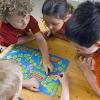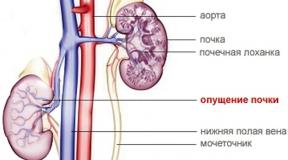Protection of the Convention on the Rights of the Child Article 9.1. What is the Convention on the Rights of the Child. Federal legislation and registered acts of the Russian Federation in the Development of the Convention
Plan:
1. Convention on the Rights of the Child
2. General provisions Convention on the Rights of the Child
1. Convention on the Rights of the Child - This is the first officially approved international document, which includes a complete list of human rights: civil and political rights along with economic, social rights, which emphasizes their importance equally.
The Convention on the Rights of the Child was unanimously approved by the UN General Assembly November 20, 1989. It is currently ratified by all states of the world with the exception of two: USA and Somalia.
The Convention determines childas a human being before reaching 18 years of age, if, according to the law, applicable to this child, he does not reach majority earlier.
The Convention establishes the necessary legal and moral standards to protect the rights of the child and does not hinder any measures to improve the rights of the child enshrined in government contracts. The States Parties to the Convention are official and moral obligations to implement the rights of the child through administrative, legislative, legal and other measures to implement the Convention.
Basic principles of the Convention
2. Best ensuring the interests of the child.
3. The right to life, survival and development.
4. Respect of the eyes of a child.
The basic idea of \u200b\u200bthe Convention is the best to ensure the interests of the child. The provisions of the Convention are reduced to four main requirements that should ensure the rights of children: survival, development, protection and ensuring active participation in society.
The Convention approves a number of important social legal principles. The main one is the recognition of a child with a full-fledged and full person. This is a recognition that children must have human rights on their own right, and not as an appendage of their parents and other guardians.
Recognizing the child with an independent entity of law, the Convention covers the whole complex of civil, political, economic, social and cultural rights. At the same time, it emphasizes that the implementation of one right is inseparable from the implementation of others. She proclaims the priority of children's interests before the needs of the state, society, religion, families.
The Convention claims that the freedom necessary to the child for the development of its intellectual, moral and spiritual abilities requires not only a healthy and safe environment, the corresponding level of health care, ensuring minimal nutritional standards, clothes and dwellings, but also providing all this in the first place, always In priority, children.
The main provisions of the Convention include:
Each child has an inalienable right to life, and states provide to the highest possible degree of survival and healthy development of the child.
Each child has the right to the name and citizenship from the moment of birth.
In all the actions of ships, social security institutions, administrative bodies dealing with the problems of children, priority is given to the best to ensure the interests of the child.
States provide every child of all rights without any discrimination or differences.
Children should not be separated from their parents for excluding cases when it is carried out by the competent authorities in the interests of their well-being.
States should promote family reunification, allowing entry into their territory or departure from it.
Parents are primarily responsible for the education of the child, but States should provide them with proper assistance and develop a network of children's institutions.
States should ensure the protection of children from causing physical or psychological damage to them and from poor circulation, including sexual abuse or operation.
States provide a suitable replacement of child care, which have no parents. The adoption process is carefully regulated and it is necessary to strive for the conclusion of international agreements in order to ensure guarantees and legal substantiation in cases where adopters intend to bring the child from the country where he was born.
Children with special needs, including children without one or both parents, devoid of custody, children of the streets, children with physical or mental disadvantages have the right to special appeal, education and care.
The child has the right to use the most advanced services of the health care system. The state should ensure the protection of the health of all children with primary attention to preventive measures, health education and reduction of infant mortality.
Primary education should be free and mandatory.
School discipline should be maintained with the help of methods reflecting the respect of the human dignity of the child. Education should prepare a child for life in the spirit of understanding peace and tolerance.
Children should have time to rest, games and the same opportunities to engage in cultural and creative activities.
States should ensure the protection of a child from economic exploitation and work, which may prevent education or damage to his health and well-being.
States should protect children from illicit drug use and participation in drug production or trade.
The death penalty or lifelong imprisonment is not appointed for crimes committed by persons under the age of 18.
Children should be detained separately from adults; They should not be subjected to torture or cruel and degrading treatment.
No child who has not reached the age of 15 should not take any participation in hostilities; Children affected by armed conflict are under special protection.
Children from national (ethnic) minorities and indigenous people should freely use the property of their own culture and native language.
Children who were subjected to poor handling, violence, detention or suffered from non-dissolution should receive proper appeal or undergo training in order to restore and rehabilitation.
With children who have become participants in the violations of criminal legislation should apply to help develop feelings of dignity and significance and to promote their reintegration into society.
States should be widely informed about the rights contained in the Convention, both adults and children.
The Convention on the Rights of the Child is called the Great Charter of Valibilities for Children. It consists of fifty-four articles, detailed by the individual rights of each person under the age of eighteen years to the complete development of its capabilities in conditions free from hunger and needs, cruelty, operation and other forms of abuse.
The Convention, which has become the result of the ten years of negotiations, was adopted by the United Nations on November 20, 1989 and entered into force on September 2, 1990. After ratifying it with twenty states. To date, 139 countries have either signed this document or became parties to the Convention as a result of ratification or accession to it. After the ratification of this or that state, the Convention acquires the status of the law on its territory, the monitoring of compliance with which will be carried out in the States Parties the Committee consisting of ten experts.
The Convention on the Rights of the Child takes a step forward compared to current international documents. It lines the rights of a child with the rights and obligations of parents and other persons who are responsible for the life of children, their development and protection, and provides the child to participate in decision-making affecting its present and future.
Among the most acute problems considered in the Convention and in some cases, first raised within the framework of the International Document, we note such as obligations towards children living in the most unfavorable conditions (Article 22), protection against sexual and other types of operation (articles 34 and 36), drug addiction (article 33), child crime (article 40), Interstate adoption practice (Article 21), children in armed conflict (Articles 38 and 39), the needs of children with disabilities (Article 23), as well as minority children and indigenous peoples (Article 30).
Education is a subject of consideration of two important articles (27 and 28), the significance of which has been emphasized at the World Education Conference for All, which held March 5-9, 1990 in Jomtien (Thailand). Primary education should be mandatory, free and accessible to everyone and aimed at the development of the child's personality, its tanks and natural abilities in the context of respect for the national identity, language and traditional values. Special emphasis is placed on the equality of educational opportunities for girls and boys.
The organic strength of the new convention consists in its flexibility, the ability to maintain its effectiveness, despite the wide variety of state approaches to solving common tasks. Not leaving aside the most delicate problems, it focuses on various cultural, religious and other value systems, offering their ways to solve common problems for all children below is a reduced presentation of the main provisions of the Convention.
PREAMBLE
The preamble indicates the fundamental principles of the United Nations and the individual provisions of relevant contracts and applications. It confirms the fact that children, as a result of their vulnerability, need special care and protection, and emphasizes the responsibility of the family in protecting the child and care about him. It also confirms the need for legal and other child protection before and after birth, emphasizes the importance of traditional cultural values, as well as the role of international cooperation in the protection of the rights of the child.
What is the child (Article 1), the child is every human being until the age of 18 is reached, if, according to the law, applicable to this child, it does not reach majority.
The lack of discrimination (Article 2) States Parties respect and provide rights ... for each child without any discrimination. States parties take all necessary measures to ensure the protection of the child from all forms of discrimination.
Ensuring the interests of the child (Article 3) in all actions against children ... The primary attention is paid to the best to ensure the interests of the child. State 1 Participants undertake to provide a child such protection and care that is necessary for his well-being, taking into account the rights and obligations of his parents, guardians or other persons responsible for him by law.
Implementation of rights (Article 4 States Parties take all necessary ... Measures to implement the rights recognized in this Convention.
Parents' rights and obligations (Article 5) States Parties respect the responsibility, rights and obligations of parents and ... members of an extended family ... to properly manage and lead the child ... and do it in accordance with the developing abilities of the child.
Survival and healthy development (Article 6) Each child has an integral right to life. States parties provide as much as possible survival and healthy development of the child name and citizenship (Article 7) The child from the moment of birth has the right to the name and the acquisition of citizenship, as well as, as far as possible, the right to know his parents and the right to their care.
The preservation of individuality (Article 8) States Parties undertake to respect the child's right to preserve their individuality, including citizenship, name and family relationships.
License with parents (Article 9) The participating States ensure that the child is not separated from its parents ... With the exception of cases, when the competent authorities, according to the court decision, determine ... what such separation is needed in the best interests of the child, the participating States resperate The right of a child who is separated from one or both parents to support ... Personal relationships and direct contacts with both parents.
Family Reunion (Article 10) States Parties respect the right of a child and his parents to leave any country, including their own, and return to their country ... In order to reunite a family ... Support ... Personal relations and direct contacts with both parents .
Illegal movement and non-return (article 11) The participating States take measures to combat the illegal movement and non-return of children from abroad.
Child's opinion (Article 12) States Parties provide a child ... the right to express fluently ... views. To this end, the child, in particular, is given the opportunity to be heard during any ... The proceedings affecting the child.
Freedom of expression of views (Article 13) The child has the right to freely express his opinion ... receive and transmit information and ideas ... regardless of the borders.
Freedom of thought, conscience and religion (Article 14) States Parties respect the child's right to freedom of thought, conscience and religion ... Rights and obligations of parents .. Lead a child in implementing his right.
Freedom of the Assembly (Article 15) States Parties recognize the child's right to freedom of associations and freedom of peaceful assembly.
Protection of the right to personal life (Article 16) No child can be an object of arbitrary or illegal interference in the implementation of his right to personal life, family life, the inviolability of housing or the secret of correspondence, or illegal encroachment on his honor and reputation.
Access to information (Article 17) States Parties ... ensure that the child has access to information and materials from various ... sources ... To this end, the participating States ... encourage the media to distribute information and materials Useful for the child in social and cultural relations and ... encourage the development of appropriate principles of protecting the child from information and materials that harm him well-being.
Responsibility of parents (Article 18) The participating States are making all possible efforts to ensure the recognition of the principle of the general and equal responsibility of both parents for the education and development of the child. States parties provide parents and legitimate guardians with proper assistance in their duties to raise children.
Protection against physical or psychological violence (Article 19) States Parties take all necessary .. Measures to protect the child from all forms of physical or psychological violence ... from parents, legal guardians or any other person taking a child. Such protection measures ... include. . Development social programs For the purpose of ... Warnings ... Cruel treatment of the child.
Child protection without parents (Article 20) The child who is temporarily or is constantly deprived of his family environment or who in his own best interests cannot remain in such an environment, has the right to special protection and assistance provided by the state. States parties in accordance with their national laws provide a replacement for the care of such a child.
Adoption (Article 21) States Parties who recognize or allow the existence of an adoption system to ensure that the child's interests were taken into account as paramount and they ensure that the child's adoption was allowed only by the competent authorities of refugee children (Article 22) States Parties accept Necessary measures in order to provide a child who wants to receive refugee status or considered refugee ... Protection and humanitarian assistance. To this end, the participating States assist any efforts to competent ... organizations .. to protect such a child and assist him.
Inadvertent children (Article 23) States Parties recognize that the child's defective in mental or physical relationship should lead a full and decent life in conditions that ensure his dignity contribute to his confidence and facilitate him active participation In the life of society, health and healthcare (Article 24) States Parties recognize the right of a child to use the most advanced health care systems and health care products and health recovery States participating the necessary measures to reduce the mortality rate of babies and child mortality, ensuring the provision of necessary medical care. and the protection of the health of all children with priority attention to the development of primary health care measures The participating States undertake to encourage international cooperation and ... seek to ensure that no child is deprived of its right to access similar health care systems Periodic assessment of the care (article 25) States parties recognize the right of a child placed by the competent authorities to care to care for it, its protection or physical or mental treatment, to a periodic assessment of the treatment provided to the child and all other conditions, associated with such care about the child.
Article 1. Defining a child
As long as you do not last 18 years old, you consider a child and have all the rights that are set out in this Convention.
You should not be subject to discrimination for any reason, including because of the race, skin color, gender, language, religion, belief, origin, social or property status, health and birth status, your parents or legitimate guardians or any other circumstances .
Article 3. Best ensuring the rights of the child
In all actions against children, priority should be given to the best provision of your interests and interests of any child.
Article 4. Implementation of the Rights of the Convention
The state should take care that the rights of this convention are available to you and all children.
Article 5. Education in the family and the development of child's abilities
Your family is the main responsibility for your education so that as you grew up, you learned to correctly enjoy your rights. The state must respect this right.
Article 6. The right to life and development
You have the right to live and develop. The state is obliged to provide your survival and healthy development.
Article 7. Registration of health, behalf, citizenship and care of parents
You have the right to official registration of your birth, name and citizenship. You have the right to know your parents and count on their care.
Article 8. Conservation of Individuality
The state must comply with your right to name, citizenship and family relationships.
Article 9. License with parents
You should not be separated from your parents except in cases where the etah of your interests (for example, when parents do not care about you or cruelly contact you). If your parents divorced, you have the right to meet regularly with them, except when it may harm you.
Article 10. Family Reunion
If you and your parents live in different countriesYou should be able to cross the borders of these countries and enter your own to maintain personal relationships with your parents or reunite your family.
Article 11. Protection against illegal movement to another country
The state should take measures to prevent illegal export of you from your country.
Article 12. Respect of the views of the child
If adults make decisions affecting your interests, you have the right to freely express your opinion and your opinion should be taken into account when making such decisions.
Article 13. Freedom of expression and information
You have the right to have, search, receive and transmit information of any kind (for example, with the help of letters, art, television, radio or Internet), if only this information does not harm you and other people
Article 14. Freedom of thought, conscience and religion
You have the right to belief and religion and you can practice our religion, unless it violates the rights of other people. Your parents must clarify these rights to you.
Article 15. Freedom of Associations and Peace Meetings
You have the right to meet and unite into groups with other children, if only it does not harm other people.
Article 16. Personal life, honor and reputation
You have the right to personal life. No one has the right to harm your reputation, as well as enter your home and read your letters or email without permission. You and your family have the right to defense against illegal encroachment on your honor and reputation.
Article 17. Access to information and media
You have the right to reliable information from different sources, including books, newspapers and magazines, television, radio and the Internet. Information should be useful and accessible to your understanding.
Article 18. Parents' Responsibility
Parents bear equal responsibility for your upbringing and development and should always take into account your best interests. The state should provide parents with adequate assistance in the education and development of children, especially if parents work.
Article 19. Protection against all forms of violence, negligent circulation and ill-treatment
The state should ensure that you care about you well, and protected you from violence, negligent relationships and ill-treatment of parents or those who care about you.
Article 20. Protection of a child deprived of a family
If parents and family can not care about you sufficiently, then people who respect your religion, tradition and language have to watch.
Article 21. Adoption
If you are adopted, first of all, you should strictly observe your best interests, regardless of whether you are adopted in the country where you were born, or you were transported to live in another country.
Article 22. Refugee children
If you came to a new country, because you have to live in your homeland, you have the right to defense and support. You have the right to the same rights as children born in this country.
Article 23. Disabled children
If you have the features of development in mental or physically, you have the right to special care, support and education, so that you can conduct a full and independent life and participate in the life of society, according to your capabilities.
Article 24. Health and Health
You have the right to protect your health (for example, medicines, access to hospitals and qualified medical professionals). You have the right to drinking water, nutritious food, pure ecology and the prevention of diseases so that you remain healthy. Rich countries should help poorer countries achieve such standards.
Article 25. Periodic assessment in care
If you are in care, and local authorities or institutions take care of you, and not your parents, the state must regularly check your living conditions to make sure that good care is ensured.
Article 26, Social Security
The society in which you live should provide you with the opportunity to use it by the benefits that help you develop and live in good conditions (for example, education, culture, nutrition, health and social security). The state must provide additional funds for children in needy families.
Article 27. Life standard
You have the right to right to the standard of living necessary for your physical, mental, and spiritual and moral development. The state should help those parents who cannot provide their children with the necessary living conditions.
Article 28. The right to education
You have the right to education. In schools, the rights of the child must be respected and respect for his human dignity is to manifest. Primary education should be mandatory and free. Rich countries should help poorer countries achieve such standards.
Article 29. Education goals
Educational institutions must develop your personality and fully disclose your talents, mental and physical abilities. They must prepare you for adult life and teach to respect your parents, cultural values \u200b\u200band traditions, their own and other countries. You have the right to learn how to enjoy your rights.
Article 30. Children belonging to minorities and indigenous people
You have the right to speak native language, keep relatives and confess your religion regardless of whether their most people in your country share.
Article 31. Rest, leisure and cultural life
You have the right to rest and games, as well as to participate in cultural and creative life.
Article 32. Child labor
The state should protect you from dangerous, harmful and unbearable work, which prevents your education and allows others to exploit you.
Article 33. Children and illegal use of narcotic drugs
The state must do everything possible to protect you from the illegal use of drugs, prevent your participation in the production and drug trafficking.
Article 34. Protection against sexual exploitation
The state should protect you from any forms of sexual violence.
Article 35. Protection against children, smuggling and abduction
The state must deal with all their forces against the abduction, smuggling and selling children to other countries for the purpose of exploitation.
Article 36. Protection against other forms of operation
You must be protected from any actions that can harm your development and well-being.
Article 37. Protection against torture, ill-treatment and imprisonment
If you violated the law, you should not treat you cruelly. You can not put in prison with adults, you should have the opportunity to maintain contact with your family.
Article 38. Protection of children affected by armed conflicts
If you were not 15 years old (18 in most European countries), the state should not allow you to join the army or directly participate in armed conflicts. Children in military conflict zones should receive special protection and care.
Article 39. Recovery Care
If you turned out to be a victim of cruel treatment, conflict, torture, neglect or exploitation, the state should do everything possible to restore your physical and mental health and give you to return to the ranks of society.
Article 40. Departation of justice in relation to minors offenders
If you were accused of violating laws, you should contact you so that your human dignity is saved. You have the right to legal assistance and you can be sentenced to imprisonment only for very serious crimes.
Article 41. Application of the highest norms
If the laws of your country protect the rights of the child better than the provisions of this Convention, the laws of this country should be applied. Article 42. Dissemination of information about the Convention
The state should disseminate information on the Convention among adults, institutions and children.
Articles 43-54. Obligations of states
These articles are explained as adults and states must work together to ensure the rights of children.
Note: The Convention on the Rights of the Child was adopted by the General Assembly of the United Nations in 1989 and entered into force in 1990. In the convention of 54 articles defining the rights of children and how these rights should be provided and supported by states. Almost all countries in the world have ratified this convention, promising to comply with all rights and freedoms of this convention.
UN Convention on the Rights of the Child
UN Convention on the Rights of the Child - International Legal Document, which determines the rights of children on education, the use of cultural achievements, the right to rest and leisure and the provision of other services to the Children to the UN member states. The Convention on the Rights of the Child is the first and basic international legal instrument in which the rights of the child were considered at the level of international law. The document consists of 54 articles detailing the individual rights of young citizens aged from birth to 18 years old on the complete development of their capabilities in conditions free from hunger and needs, cruelty, operation and other forms of abuse. The Convention on the Rights of the Child is ratified by all UN member countries, except US and Somalia.
History of creation
The main provisions of the Convention
The first part of the Convention
- Articles 1-4 determine the concept of "child" and approve the priority of children's interests before the interests of society.
- Articles 5-11 determine such essential rights of children, as the right to life, name, citizenship, the right to know their parents, the right to the work of parents and the in -urement, rights and obligations of parents in relation to children.
- Articles 12-17 set out the rights of children to express their views, their opinions, to freedom of thought, conscience and religion, associations and peaceful assembly, the child's access to the dissemination of information.
- Articles 20-26 determine the list of rights of special categories of children, as well as the state duties for protection and assistance to such children.
- Articles 28-31 enshrine the rights of children to the standard of living necessary for the physical, mental, spiritual, moral and social development of the child, as well as the right to education, rest and leisure.
- Articles 32-36 establish the responsibility of the state in protecting the rights of children from exploitation, from the illegal use of drugs, abductions and trafficking in children.
- Articles 37-40 define the rights of a child who has fallen into place of conclusion, as well as the right of children to protect during armed conflicts and wars.
Second part of the Convention
- Articles 41-45 mention how to inform the basic provisions of the Convention and the mechanisms for monitoring the execution of the participants of the Convention.
Third part of the Convention
- Articles 46-54 indicate the decision of the procedure and legal problems of compliance by states of the provisions of the Convention. Unlike many UN conventions, the Convention on the Rights of the Child is open for signing by all states, therefore, it was able to become a member of the UN Vatican.
The innovation of the Convention is primarily in the volume of rights defined for the child. Some of the rights were first recorded in the Convention (see Articles 12-17).
Convention on the right of the child on education and to raise children
Convention in Art. 28 guarantees children a free and mandatory primary education and requires UN Member States to promote the development of various forms of secondary education, both in common and professional, ensuring its accessibility for all children and the adoption of the necessary measures as the introduction of free education. Convention Significant Place is given the right to accessibility. higher education For all based on the abilities of each with all necessary funds.
An integral part of education is upbringing. So among the tasks of family education, the Convention (Article 18) requires "all possible efforts to ensure the recognition of the principle of the general and equal responsibility of both parents for the upbringing and development of the child. Parents or as appropriate, legitimate guardians are primarily responsible for the education and development of the child. The best interests of the child are the subject of their main concern. "
- Article 20 determines the tasks of the public education of children (care for them) who have deprived of parents. "Such care may include, in particular, transfer to education, adoption or, if necessary, room in the relevant care institutions. When reviewing replacement options, it is necessary to properly take into account the desirability of the continuity of the child's education and its ethnic origin, religious and cultural affiliation and native language. "
- Article.21 of the Convention determines the rights of the child in adoption in another country: "Adoption in another country can be considered as an alternative way to care for a child if a child cannot be transferred to education or placed in a family that could provide its upbringing or adoption, And if the provision of any suitable care in the country of origin of the child is impossible. "
- Principal in ensuring the rights of children for education is Art. 29 of this document. It is practically regulated for the participating countries of the Public Education Targets:
a) the development of the personality, talents and mental and physical abilities of the child in their fulfillment; (b) Education of respect for human rights and basic freedoms, as well as the principles proclaimed in the Charter of the United Nations; (c) Education of respect for parents of the child, its cultural identity, language and values, to the national values \u200b\u200bof the country in which the child lives, the countries of its origin and to civilizations other than its own; (d) Preparation of a child to conscious life in a free society in the spirit of understanding, peace, tolerance, equal rights of men and women and friendship between all nations, ethnic, national and religious groups, as well as persons from the number of indigenous population; e) Education of respect for the surrounding nature.
Federal legislation and registered acts of the Russian Federation in the Development of the Convention
- 1993 UN Committee on the Rights of the Child at its 62, 63 and 64 meetings held on 21 and 22 January 1993 reviewed the initial report submitted in accordance with Article 44 Russian Federation On the implementation of the Convention on the Rights of the Child and adopted relevant comments.
- 1993 - the Government of the Russian Federation adopted Resolution No. 848 of August 23, 1993 "On the implementation of the UN Convention on the Rights of the Child and the World Declaration on Ensuring the Survival, Protection and Development of Children."
- 1993 - Government of the Russian Federation Resolution No. 1977 dated October 23, 1993 approved the provision "On the Commission for Coordination of Works related to the implementation of the UN Convention on the Rights of the Child and the World Declaration to ensure the survival, protection and development of children in the Russian Federation."
- 1993 - the Government of the Russian Federation established a commission to coordinate work related to the implementation of the Convention on the Rights of the Child and the World Declaration on Ensuring the Survival, Protection and Development of Children in the Russian Federation (existed until 2004, since 2006, a government commission on juvenile affairs and protection Their rights, as well as the Government Commission on the Rights of the Child in the Russian Federation).
- 1994 - President of the Russian Federation Decree No. 1696 of August 18, 1994 approved the Presidential Program "Children of Russia".
- 1995 - President of the Russian Federation signed Decree No. 942 of September 14, 1995 "On approval of the main directions of state social policy to improve the situation of children in the Russian Federation until 2000 (the National Action Plan for Children)."
- 1995 - the Family Code of the Russian Federation was adopted.
- 1995 - adopted by the Federal Law of 98-FZ "On State Support for Youth and Children's Public Associations".
- 1997 - Decree of the Government of the Russian Federation of September 19, 1997 No. 1207 "On federal target programs to improve the situation of children in the Russian Federation for 1998-2000" approved Federal Target Programs to improve the situation of children in the Russian Federation, Decree of the President of the Russian Federation " The presidential program "Children of Russia" of January 15, 1998 No. 29, these programs are combined into the program "Children of Russia", which is assigned the status of the presidential.
- 1998 - approved the second periodic report of the Russian Federation on the implementation of the Convention on the Rights of the Child and the application to it.
- 1998 - the State Duma of the Russian Federation, and the President of the Russian Federation approved the Federal Law of July 4, 1998 No. 98-FZ "On Basic Guarantees of the Rights of the Child in the Russian Federation"
- 2000 - Decree of the Government of the Russian Federation of August 25, 2000 approved 10 federal targeted programs to improve the situation of children for 2001-2002 (due to the expiration of the term of the presidential program "Children of Russia).
- 2002 - Decree of the Government of the Russian Federation of October 3, 2002 No. 732 approved the Federal Target Program "Children of Russia for 2003-2006".
- 2002 - approved the third periodic report on the implementation of the Russian Federation of the UN Convention on the Rights of the Child (1998-2002).
- 2004 - Federal Law No. FZ-122 of August 22, 2004 amended the Law "On Basic Guarantees of the Rights of the Child in the Russian Federation" in terms of expressing the powers between the Russian Federation and the constituent entities of the Russian Federation.
- 2004 - Federal Law No. FZ-190 dated December 21, 1994 Amendments were amended to the Law "On Basic Guarantees of the Rights of the Child in the Russian Federation" in terms of the rights of the child in Russia for rest and rehabilitation.
- 2006 - approved by the decrees of the President of the Russian Federation and the relevant regulatory decisions of the Russian Federation mechanisms for the implementation of priority national projects "Education", "Health".
- 2006 - Decree of the Government of the Russian Federation of May 6, 2006 No. 272 \u200b\u200bapproved the Government Commission on Minors and the protection of their rights.
- 2006 - a joint order of the Ministry of Health and Social Development of Russia, the Ministry of Education and Science of Russia, the Ministry of Culture of Russia of June 28, 2006 No. 506/168/294 created an interdepartmental commission on family and children.
- 2007 - Decree of the Government of the Russian Federation of March 21, 2007 No. 172 approved the Federal Target Program "Children of Russia for 2007-2010".
- In 2007, the instructions of the President of the Russian Federation in June 2007, the Government was instructed to develop a new Federal Target Program aimed at preventing offenses among children and young people, including sports, cultural orientation events.
Literature
- Schnekendorf Z.K. Guide to the Convention on the Rights of the Child. - M., 1997.
see also
- European Convention on the Protection of Human Rights and Fundamental Freedoms
- Optional Protocol to the Convention on the Rights of the Child Concerning Trade of Children, Children's Prostitution and Child Pornography ()
Links
- The official text of the Convention on the Rights of the Child in Russian
- Swedish organization "Save children" (Rädda Barnen) is in the forefront of the support of the Convention on the Rights of the Child
- Activities of international bodies in the protection of the rights of the child
- Rights of children in the Russian Federation: legislation and practice
- Regulations on the government commission on juvenile affairs and the protection of their rights
| Human rights | |||||||||||||||||||||||
|---|---|---|---|---|---|---|---|---|---|---|---|---|---|---|---|---|---|---|---|---|---|---|---|
| Fundamental concepts and categories | |||||||||||||||||||||||
| Fiduciary contract · Freedoms · Group rights · Natural and legal rights · Negative and positive rights · Sovereignty · Universality · Universal jurisdiction | |||||||||||||||||||||||
|
|||||||||||||||||||||||
| International human rights law | |||||||||||||||||||||||
| Declaration | |||||||||||||||||||||||
| Cairo Declaration of Human Rights · Declaration of Indigenous Rights · Universal Declaration of Human Rights American Declaration of Human Rights and Responsibilities · Paris Principles |
|||||||||||||||||||||||
| Conventions and Covenants | |||||||||||||||||||||||
| Convention of the UN against Torture · Convention on the Elimination of All Forms of Discrimination against Women · Convention on the Elimination of All Forms of Racial Discrimination · Convention on Persons with Disabilities · Convention on the Rights of the Child · International Convention for the Protection of the Rights of All Migrant Workers and Members of their Families · International Convention for the Suppression and Punishment of Apartheid Crimes · International Convention on the Protection of All Persons from Enforced Disappearance (English) · International Covenant on Civil and Political Rights · International Covenant on Economic , social and cultural rights | |||||||||||||||||||||||
| Regional Acts of Human Rights | |||||||||||||||||||||||
| African Charter of Human Rights and Peoples · European: European Convention on Human Rights and Fundamental Freedoms · European Convention for the Prevention of Torture and Inhuman or Degrading Treatment or Punishment · European Social Charter Inter-American: American Convention on Human Rights · Inter-American Convention on the Enforced Disappearance of People in the Inter-American Convention for the Prevention and Punishment of Torture (English) in the Inter-American Convention on Prevention, Punishment and Eradication for Women's Violence in the Inter-American Convention on the Elimination of All Forms of Discrubmices Disabilities |
|||||||||||||||||||||||
| International Humanitarian Law | |||||||||||||||||||||||
| Convention for the Prevention and Punishment of the Genocide Crime (English) · Convention on the Status of Refugees (English) · Protocol on the status of refugees (English) · Geneva Conventions · Hague Conventions · Roman Statute of the International Criminal Court (English) | |||||||||||||||||||||||
| War and Armed Conflict | Civilian · combatant · freedom from genocide · captivity | ||||||||||||||||||||||
| Concepts that can be considered as human rights | |||||||||||||||||||||||
| Civic and political |
The right to death (eng.) · The right to personal integrity · Freedom · Freedom of movement · Freedom from slavery · Personality · Morphological freedom · The right to weapons (eng.) · Equality before the law (English) · The right to treatment · Freedom from arbitrary Arrest and detention · Freedom from torture and ill-treatment · Right to fair and impartial justice · Presumption of innocence · Political asylum · Subscription · Freedom from expulsion · Privacy · Freedom of conscience · Freedom of religion · Freedom of speech (freedom of information) · Freedom of assembly · Freedom of Association · Protest Right · Right Voice · Marriage Union · Family Life · Minority Rights (English) · Right to life | ||||||||||||||||||||||
| Economic Social and cultural |
The right to work (English) · the right to remuneration · the right to just pay | ||||||||||||||||||||||
The Convention on the Rights of the Child is called the Great Valibacy Charter for
children. It consists of fifty four articles detailed
individual rights of each person under the age of eighteen
the complete development of its capabilities in conditions free from hunger and needs,
cruelty, operation and other forms of abuse.
The Convention, which has become the result of ten years of negotiation, was adopted
september 1990. After ratifying it with twenty states. To real
the moment of 139 countries either signed this document or became participants
Convention as a result of ratification or accession to it. After
ratification of this or that state the Convention acquires
territory the status of the law, the control over the observance of which will
implement in States Parties Committee as part of ten experts.
The Convention on the Rights of the Child takes a step forward compared to
existing international documents. She lies the rights of a child with
rights and obligations of parents and other persons responsible for
the life of children, their development and protection, and gives the child the right to participate
in making decisions affecting its present and future.
Among the most acute problems considered in the Convention and
in some cases, first raised in the framework of the International Document, we note
such as obligations towards children living in the most
unfavorable conditions (article 22), protection against sexual and other species
operation (Articles 34 and 36), drug addiction (article 33), child crime
(Article 40), interstate adoption practice (Article 21), children in
armed conflicts (Articles 38 and 39), the needs of children with disabilities (article
23), as well as children of minorities and indigenous peoples (Article 30).
Education is the subject of consideration of two important articles (27 and
28), the significance of which was newly emphasized at the World Conference on
Primary education must be mandatory, free and affordable.
each and aimed at the development of the child's personality, its tales and
natural abilities in the conditions of relevant respect for the national
identity, language and traditional values. Special emphasis is on
equality of educational opportunities for girls and boys.
The organic strength of the new convention consists in its flexibility, ability
maintain its effectiveness, despite the wide variety of approaches
states to solve common tasks. Not leaving aside the most delicate
problems, it is focused on various cultural, religious and other
value systems offering their ways to solve common for all children
The following is a reduced presentation of the main provisions of the Convention.
PREAMBLE
The preamble indicates the fundamental principles of the organization
United Nations and individual provisions of relevant contracts and
statements. It confirms the fact that children, due to their
vulnerabilities need special care and protection, and emphasized
the responsibility of the family in protecting the child and care about him. In it also
confirmed the need for legal and other child protection before and after
birth, emphasizes the importance of traditional cultural values \u200b\u200bas well
the role of international cooperation in the protection of the rights of the child.
What is the child (Article 1)
The child is every human being until 18-year-old
age, if, by law, applicable to this child, it does not reach
majority earlier.
No discrimination (article 2)
States parties respect and provide rights ... for each
child without any discrimination. States parties take all
necessary measures to ensure the protection of the child from all forms of discrimination.
Ensuring the interests of the child (Article 3)
In all actions against children ... priority attention
it is paid to the best to ensure the interests of the child. State 1 Participants
undertake to provide a child such protection and care that is necessary for
his well-being, taking into account the rights and obligations of his parents,
guardians or other persons responsible for him by law.
Implementation of rights (Article 4
States parties take all necessary ... Measures for
implementation of rights recognized in this Convention.
Rights and Responsibilities of Parents (Article 5)
States parties respect responsibility, rights and obligations
parents and ... members of an extended family ... to properly manage and
lead a child ... and do it in accordance with developing
child abilities.
Survival and Healthy Development (Article 6)
Each child has an integral right to life. States Parties
provide to the maximum degree of survival and healthy development
Name and citizenship (Article 7)
The child from the moment of birth is entitled to the name and acquisition
citizenship, as well as, as far as possible, the right to know their parents and
the right to their concern.
Preservation of individuality (Article 8)
States parties undertake to respect the right of a child to save
your individuality, including citizenship, name and family relationships.
License with parents (Article 9)
States parties ensure that the child is not separated from
his parents ... except in cases where the competent authorities,
according to a court decision, determine ... what separation is necessary in
the best interests of the child, the participating States respect the child's right,
which can be separated with one or both parents, support ... Personal
relationships and direct contacts with both parents.
Family Reunion (Article 10)
States parties respect the right of a child and his parents leave
any country, including its own, and return to your country ... with
the purpose of family reunification ... to support ... Personal relationships and direct
contacts with both parents.
Illegal movement and non-return (article 11)
States parties take measures to combat illegal
the movement and non-return of children from abroad.
Child Opinion (Article 12)
States parties provide a child ... right free
express ... Views. To this end, the child, in particular, is provided
the ability to be heard during any ... proceedings,
affecting the child.
Freedom of expression views (Article 13)
The child has the right to freely express his opinion ... receive and
transfer information and ideas ... regardless of the borders.
Freedom of thought, conscience and religion (Article 14)
States parties respect the child's right to freedom of thought, conscience and
religions ... rights and obligations of parents .. lead the child in
implementation of his right.
Freedom of the Assembly (Article 15)
States parties recognize the right of a child to freedom of associations and
freedom of peaceful assembly.
Protection of the right to personal life (Article 16)
No child can be an object of arbitrary or illegal.
interventions in the implementation of his right to personal life, family life,
inviolability of housing or the secret of correspondence, or illegal
encroachment on his honor and reputation.
Access to information (Article 17)
States parties ... ensure that the child can have access to
information and materials from various ... sources ... for this purpose
states parties ... encourage the media to
disseminating information and materials useful for the child in social and
cultural relations and ... encourage the development of appropriate principles of protection
child from information and materials that harm him well-being.
Responsibility of parents (Article 18)
States parties are committed to all possible efforts to ensure that
ensure the recognition of the principle of the general and equal responsibility of both
parents for the upbringing and development of the child. States parties render
parents and legitimate guardians proper assistance in their fulfillment of their
responsibilities for raising children.
Protection against physical or psychological violence (Article 19)
States parties take all necessary .. measures to protect
child from all forms of physical or psychological violence ... from the part
parents, legal guardians or any other person taking care of
kid. Such protection measures ... include. . development of social programs with
the purpose of ... Warnings ... Cruel treatment of a child.
Child protection without parents (Article 20)
A child who is temporarily or is constantly deprived of his family
environments or which in his own best interest can not
stay in such an environment, has the right to special protection and assistance,
provided by the state. States parties in accordance with their
national laws provide a replacement for the care of such a child.
Adoption (Article 21)
States parties that recognize or allow existence
adoption systems, ensure that the child's interests were taken into account in
paramount and they provide to adopt a child
allowed only by the competent authorities
Refugee children (Article 22)
States parties take the necessary measures to
provide a child who wants to get refugee status or considered
refugee ... protection and humanitarian aid. To this end, the participating States
promote any efforts of competent ... Organizations .. protection
such a child and assist him.
Lady children (Article 23)
States parties recognize that defective in mental or
physically the child should lead a full-fledged and decent life in
conditions that provide his dignity contribute to his confidence
in itself and make it easy to actively participate in the life of society
Health and Health Care (Article 24)
States parties recognize the right of the child to use the most
adhesive health care systems and disease treatment
and health recovery States participating takes the necessary measures
to reduce mortality rates of babies and child mortality, ensuring
providing the necessary medical care and the protection of the health of all children with
the focus on the development of primary health care
aid States Parties undertake to encourage international cooperation
and ... seek to ensure that no child is deprived of his right
for access to such health care systems
Periodic assessment of the care (Article 25)
States parties recognize the right of a child placed competent
organs to care to care for it, its protection or physical or
mental treatment, on a periodic assessment of the treatment provided
child, and all other conditions related to such care about the child.
Social security (article 26)
States parties recognize every child the right to use
social Security Boards, including Social Insurance
Life standard (Article 27)
States parties recognize the right of every child to standard
necessary for physical, spiritual, moral and social development
child parent (s) or other people raising a child carry the main
responsibility for "providing within its abilities and financial
opportunities of the living conditions necessary for the development of the child
States parties take the necessary assistance measures
parents and other children raising children
Education (Article 28)
States parties recognize the right of the child to education, and with the aim
gradual achievement of this right on the basis of equal
opportunities they, in particular a) introduce free and mandatory initial
education; b) encourage the development of various forms of secondary education
provide its availability for all children; c) provide accessibility
higher education for all on the basis of the abilities of each
States parties take all necessary measures to ensure that
so that school discipline is supported using methods reflecting
respect for the human dignity of the child .. States parties encourage
and develop international cooperation on issues related to education
Education goals (Article 29)
States parties agree that the child's education should
to be aimed at the development of personality, talents and mental and physical
child abilities in their fulfillment, preparing the child
conscious life in free society; Education of respect for parents
child, his cultural identity, language and values, to national
the values \u200b\u200bof the country in which the child lives, its countries of origin and
civilizations other than his own
Child belonging to minorities or indigenous population (article
Child belonging to minorities or indigenous population
can be denied right together with other members of their group
use your culture native language.
Rest, Leisure and Cultural Events (Article 31)
States parties recognize the child's right to rest and leisure, right
participate in games and. in cultural life and engage in art
Child labor (article 32)
States parties recognize the child's right to defense
any work that may be dangerous for his health, or
serve an obstacle to educating them, or to damage it
health and Physical, Venna, Spiritual, Moral and Social
the development of the State party establish the minimum age or
minimum ages for admission to work; Determine the necessary requirements
on the duration of the working day and working conditions.
Drug use (Article 32)
States parties take all necessary measures in order to
protect children from the illegal use of narcotic drugs and
psychotropic substances and prevent the use of children in illegal
production such Substances and trading them.
Sexual Operation (Article 33)
States parties undertake to protect the child from all forms
sexual exploitation and sexual seduction. For these purposes
states parties are accepted .. All necessary measures to prevent
use in order to operate children in prostitution or pornography and
pornographic materials
Kidnapping and trade in children (Article 35)
States parties are accepted at the national, bilateral and
multilateral levels all necessary measures to prevent abduction
children, trafficking in children or their smuggling for any purpose and in any form.
Other forms of operation (Article 36)
States parties protect the child from all other forms
exploitation of damage to any aspect of the child's welfare
Torture and imprisonment (Article 37)
States parties ensure that no child is
subjected to torture .. was not deprived of freedom illegal or arbitrary
way. Neither death penalty nor life imprisonment
providing for the possibility of liberation, are not appointed for crimes,
committed by persons under the age of 18 ... each deprived child must
be separated by adults, unless it is believed that in the best
the interests of the child should not be done, and have the right to maintain communication
with her family, every child deprived of his freedom has the right to
immediate access to legal and other relevant assistance.
Armed conflicts (Article 38)
States parties take all possible measures to ensure
that people who have undergone 15 years of age do not take direct
participation in hostilities ... States parties refrain from
call for any person who has not reached 15 years of age
armed forces. According to its obligations on international
humanitarian law related to the protection of civilians during
armed conflicts, States Parties undertake to take all
possible measures to ensure the protection of the affected armed
conflict children and care for them.
Recovery measures (Article 39)
States parties take all necessary measures to
promote physical and psychological recovery and social
reintegration of a child who is a victim: any kinds of neglect or
abuse, torture or any other cruel, inhuman or
degrading the dignity of appeal, punishment or armed conflict.
Departing legislation on child crime (Article 40)
States parties recognize the right of every child, which, as
it is believed to violated criminal law, accused or admits
guilty of his violation, on such an appeal, which contributes to the development
the child has a sense of dignity and significance, strengthens in it respect for
human rights and basic freedoms of others and in which age is taken into account
child and the desirability of promoting his reintegration and the fulfillment of them useful
roles in society. Each child has the right to basic guarantees .. and
obtaining legal and other necessary assistance in preparing and
implementing its defense. States parties seek to promote.
taking measures to handle such children without the use of judicial
proceedings
Level of ensuring the rights of the child (Article 41)
Nothing in this Convention affects any provisions that
more contribute to the implementation of the rights of the child and may be contained
a) in the law of the State party; b) in the norms of international law,
existing in relation to this state
Performance and entry into force (Articles 42-54)
The provisions of Articles 425-4 provide for the following:
States parties undertake to use appropriate and effective
funds widely inform about the principles and provisions of the Convention as
adults and children.
Established the Committee on the Rights of the Child, which consists of ten
experts .. States parties undertake to submit to the Committee ..
reports .. for two years after the entry of the Convention into force for
relevant state party; Subsequently every five years.
This Convention comes into force on the thirtieth day after passing
storage by the Secretary General of the United Nations Twentieth
ratification letter or accession document.
States parties provide wide publicity of their reports in
his own countries
Secretary-General to conduct research on its behalf
questions regarding the rights of the child.
In order to promote the effective implementation of the Convention and encourage
international cooperation in the field covered by this Convention:
a) Specialized agencies. Children's Fund of the United
Nations and other United Nations bodies have the right to be
submitted when considering the implementation of such provisions
this Convention, which includes their powers ...
The Committee transfers when he considers it appropriate, in
specialized agencies. Children's Fund of the United Nations and
other competent authorities Any reports of participating States in which
contains a request for technical advice, or help, or indicated
on the need for this, as well as comments and proposals of the Committee, if
these are available, relative to such requests and instructions.



















